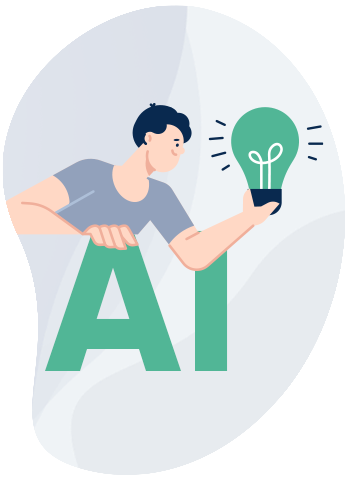In 2025, Poland’s tech hubs (including Warsaw, Kraków, Wrocław, and Poznań) are emerging as hotspots for AI Engineering specialists, driven by global investment, strong STEM education, and a growing base of experienced engineers.
But who are these specialists, what do they actually do, and where can you find them? This guide breaks it down for employers and HR specialists with clear, practical answers to help you hire the right AI talent.
Who Are AI Engineering Specialists?
AI Engineering specialists build end-to-end, production-grade AI solutions.
Unlike data scientists who explore data or ML engineers focused on algorithms, AI engineers navigate the entire lifecycle, from data pipelines to API deployment. They use tools like TensorFlow, PyTorch, Docker, and Kubernetes to turn models into reliable services.
AI Engineer vs. Data Scientist vs. ML Engineer: What’s The Difference?
AI engineers handle model deployment, scaling, and monitoring, while data scientists focus on data exploration and analysis. ML engineers apply algorithms and compute-intensive frameworks. The AI engineer works across both domains, managing software architecture and ensuring seamless integration with business systems.
| Data scientists focus on exploring data. ML engineers build models. AI engineers take models to production and integrate them into systems. |
Core Competencies and Skills of AI Engineers
The best AI engineering specialists blend strong technical skills with solid engineering mindsets. Employers seek candidates who understand math, programming, DevOps, and lifecycle management.
Core Technical Skills
- Programming: Strong Python skills and knowledge of C++/Java if high performance is needed.
- ML Frameworks: Fluency with TensorFlow, PyTorch, scikit-learn.
- DevOps Tools: Docker, Kubernetes, MLflow, Kubeflow.
- MLOps: Production pipelines, monitoring, drift detection, orchestration.
Core Soft Skills
- Strong project management
- Team collaboration
- Effective communication (especially translating business requirements into tech solutions)
What Senior AI Specialists Bring to Employers
Senior AI engineers do more than build models. They manage the full lifecycle of machine learning in production, from architecture decisions to monitoring pipelines after deployment. But their work doesn’t stop at accuracy. It extends to scalability, security, and long-term maintenance.
Advanced ML Techniques and Architecture
At a senior level, engineers should understand model versioning, continuous training, and drift detection. They need experience with distributed systems and tools like MLflow, Kubeflow, or Vertex AI. Understanding architecture trade-offs, like when to use serverless compute vs. dedicated clusters or how to balance latency and throughput, is key.
Leadership and Mentoring in AI Teams
Strong senior AI specialists also mentor juniors and shape internal best practices. They bridge tech and strategy, translating business problems into AI solutions. Their influence stretches into hiring, onboarding, and upskilling.
Why Poland’s AI Engineering Talent Pool Is Worth Investing In
With global giants eyeing Poland as an AI hub, local demand is climbing. Poland’s IT sector now exceeds €8.3 billion in revenue, with over 91,000 software developers active in 2024. (1)
The demand for AI engineers is projected to reach 11.7 million roles by 2030, growing at ~21% annually (2). This demand surged nearly 100% by Q1 2025 compared to 2023, and AI-driven roles dominate hiring for cloud, big data, and cybersecurity (3).
| – Poland’s IT services market is expected to reach $10.4 billion in 2025. (4) – Poland boasts approximately 50,000 AI engineers—surpassing neighboring countries in supply. (5) |
International players like Google are investing heavily here, launching a hub in Warsaw focused on energy and cybersecurity AI (6). The reason behind this interest? Cost-efficiency combined with high-caliber talent.
Polish AI engineers cost less than their U.S. peers but bring the same level of skill. On average, you’re looking at $66–81K a year. That’s top-level work for a much lower price.
Compared to Western Europe or the U.S., hiring in Poland can save you 40-60% (7), and you still get great talent, strong English skills, and easy time zone overlap.
Salary Ranges: How Much You Need to Pay
| – Budgeting for AI talent? Here’s what the market data says:Mid-senior engineers average around PLN 21,500/month and leads around PLN 34,000/month. (8) – Annual averages for AI engineers land between PLN 197,800–201,000. (9) – In an international context, Poland’s AI engineers earn around $66,500 USD/year, which is significantly lower than in the US but offering the same or even higher technical depth. (10) |
What Recruiters Should Look for in Resumes and Interviews
Hiring for AI roles isn’t easy. Resumes are packed with buzzwords, but that doesn’t mean the candidate can deliver. Good recruiters know how to dig deeper and look for proof, not promises.
A solid resume should show:
- End-to-end project experience (not just academic models)
- Production deployment of ML systems
- Contributions to GitHub repos or open-source tools
- Experience with MLOps tools or data pipelines
Look for outcomes, not just effort. A line like “Deployed fraud model that cut false positives by 35%” says a lot more than “worked on machine learning.”
In interviews, test both skills and thinking. Coding challenges are a start, but system design and case-based questions show how they solve problems in the real world.
Ask questions like:
- How did you handle model versioning?
- Tell me about a model that failed in production. What went wrong? How did you fix it?
- What trade-offs have you made between speed and accuracy?
You’re not hiring a math expert. You’re hiring someone who can build, ship, and maintain working systems. Prioritize that.
Where to Source AI Engineering Talent in Poland
Sourcing in Poland works best when you combine job boards, networks, and local insight. While LinkedIn can be a good starting point, it’s often overcrowded.
Top platforms to look at:
- JustJoin.IT – Popular among Polish developers
- NoFluffJobs – Focus on tech jobs with full transparency
- RocketJobs.pl – Business and digital tech focus
You can also use services and platforms like Talent Place, All IT Club, or JustGeek.IT for targeted hiring. Reddit communities, Discord channels, and GitHub stars also reveal highly active engineers. These won’t always apply for jobs, but they’re open to the right offer.
Beyond LinkedIn and JustJoin.IT, ask yourself where the best AI engineers gather:
- University hubs (AGH, Warsaw Tech)
- Meetups (AI & NLP Day, Devoxx, local Python user groups)
- Specialized platforms (Talent Place, DevsData; GitHub/Reddit forums)
How to Keep Top AI Talent
Hiring a specialist is one thing. Keeping them is another, especially if you’re an international company new to the market. But retention doesn’t have to be a mystery. Here’s what works:
Give them ownership. Senior engineers don’t want to just follow specs. Let them shape architecture, lead projects, and mentor juniors.
Support their growth. Cover certifications like Google’s ML Engineer or Azure AI. Offer time and budget for online courses or conferences.
Offer time for internal innovation. Projects outside the roadmap (like tooling improvements or hackathons) keep them engaged and invested.
Recognize their impact. Highlight wins tied to business outcomes. Engineers who see their work matter tend to stick around.
Stay competitive on salary. It’s not everything, but it matters, especially when global firms are scouting the same talent.
Conclusions
Hiring well starts with knowing the landscape. Understand the market rates, what top AI engineers expect, and how to spot real skills, and meet the market where it is.
If you’re building or scaling AI teams in Poland, we can help. At Talent Place, we connect you with vetted, senior-level tech talent. Our community-driven sourcing model means we reach candidates others miss.
Ready to hire smarter? Contact us here.
FAQ
1. Are AI engineers in demand in Poland?
Yes. Tech, finance, and healthcare sectors are actively hiring, especially in Warsaw, Kraków, and Wrocław.
2. How much do AI engineering specialists earn in Poland?
Mid-level roles start around 18,000–22,000 PLN/month (B2B). Senior roles can reach 30,000+ PLN, depending on skills and scope.
3. Do I need a PhD to become an AI engineer?
No. A strong portfolio and production experience count more than academic degrees, especially in startups and product companies.
4. What tools do AI engineers use daily?
Python, TensorFlow, PyTorch, Docker, Git, AWS/GCP, MLflow, and sometimes Spark for data pipelines.
5. Where should I apply if I’m looking for my first AI job?
Startups and smaller product teams often hire juniors. Look on JustJoin.IT, NoFluffJobs, or through Talent Place.
6. Can remote candidates get hired by Polish companies?
Yes. Many tech firms in Poland support remote or hybrid models, especially for AI roles where talent is scarce.
References
- Hiring IT Developers In Poland In 2024 | DevsData
- AI Engineers Demand Outlook | Knowledge Sourcing Intelligence
- Trends in the Polish job market for 2025 | LinkedIn
- The real ROI of Polish tech teams in 2025 | Pwrteams
- Cost to Hire AI Developers in 2025: CEE, LATAM & Asia | Index.dev
- Google hub in Poland to develop AI use in energy and cybersecurity sectors | AP News
- Polish Software Developers: Salaries and Insights 2025 | ALCOR
- AI/ML Engineer Salary in Poland | Intentio
- AI/ML Engineer Salary in Poland | Intentio
- Cost to Hire an AI Engineer in 2025 | Near

